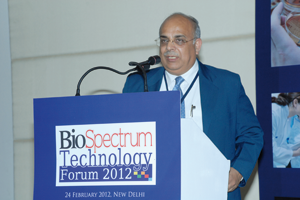“Critical policy matters must be dealt immediately�
April 08, 2014 | Tuesday | News | By Rahul Koul Koul
“Critical policy matters must be dealt immediately�
(File Photo) Dr Jitendra N Verma, managing director, Life Care Innovations, Gurgaon.
"These policy changes are critical and should not wait for change of government. These matters of national interest, particularly those that require administrative decisions and do not have to wait for legislation should be accorded priority by the government of the day," mentioned Dr Verma when asked about his expectations from the next government.
The first issue highlighted by Dr Verma is the need for higher level of financial support to the start-ups and MSMEs, for both pre-clinical and clinical development of biotech especially biopharma products. The funds need to be made available in the form of grants-in-aid to MSMEs. Generally Start-ups have bright ideas that remain buried in the files for the want of funds required for development, particularly clinical trials. Partial funding schemes do not serve the intended purpose. They shore up only cash rich large companies. Withdrawing such partial funding schemes will not do any harm as large companies can pursue their goals without partial funding and MSMEs cannot proceed despite such partial grants-in-aid. To replenish the corpus, the funds may be recovered by the government as royalty on commercialization. This will ensure that investments on early stage developments in the academic labs are not wasted away for the want of requisite funds to take science for societal benefits and would also promote entrepreneurship."
Talking about the patents, Dr J N Verma says that these should be granted for significant period of time (years) post-commercialization to ensure returns on R&D investments. "Clinical trials and field trials of biotech and bio-pharma products consume most of patent life, depriving return on investments in R&D and thus discouraging R&D for developing new drugs or products," he said.
Dr Verma goes on to mention that the to prevent sub-par "claimed generics and similar", domestic or imported to come to market, non-inferiority trials shall be made mandatory as pre-requisite for marketing approval applications. DBT-CDSCO Guidelines on Similar Biologics: Regulatory Requirements for Marketing Authorization in India under the chairmanship of Dr GN Singh (DCGI) and Dr VP Kamboj (chairman, RCGM and ex-director, CDRI and Honorary Scientist, INSA) states that "--- it is essential that the testing of the similar biologic be sufficient to ensure that the product meets acceptable levels of safety, efficacy and quality to ensure public health."
However, Dr Vermafinds it Ironic that despite widely reported slip-ups in the public domains, remedial action is not forthcoming from CDSCO that would restrain sale of products with questionable toxicity and efficacy without ensuring their safety through clinical trials and non-inferiority trials.
He says that there should be co-ordination between CDSCO and procurement agencies about the recommended doses of each product approved for marketing. Tenders and rate contracts should clearly invite quotes for daily dose to prevent procurement on the basis of cost of sub-therapeutic doses of sub-par/untested substitutes. It is important in the interest of patients' safety and wastage of precious government funds.
Finally, Dr Verma believes that to encourage entrepreneurship, it would immensely help to create insurance schemes in case a young entrepreneur fails in their endeavour. "Such insurance schemes can be created with adequate safeguard to minimise abuse,"concludes Dr Verma.









